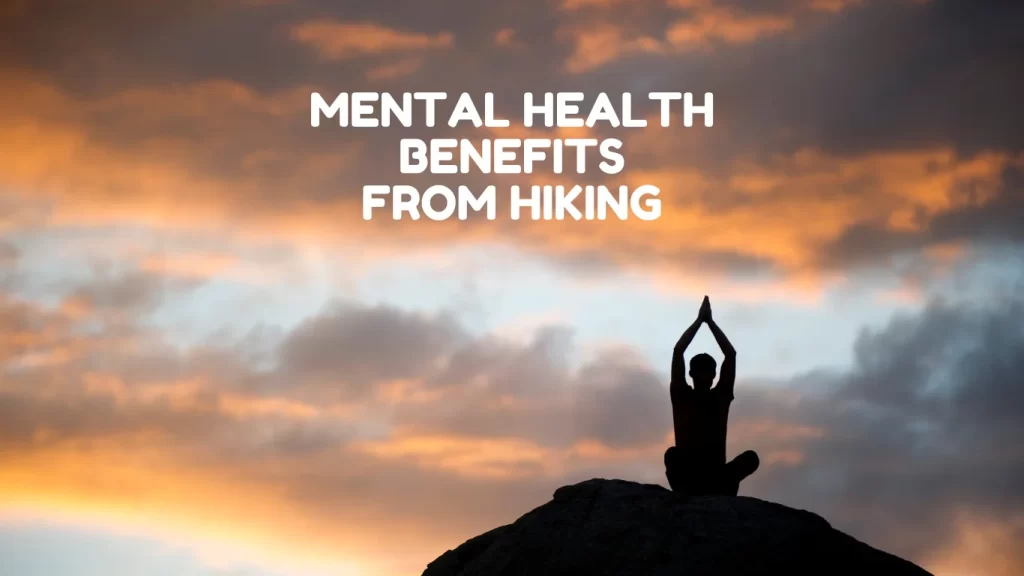Hiking is not just a way to enjoy the great outdoors; it’s a comprehensive workout that can improve cardiovascular health, muscle strength, and flexibility. Hiking health research has shown that it plays a significant role in enhancing mental health by reducing stress and helping with mental clarity, from the physical benefits of hiking that are likened to a full-body workout, to the cardio benefits of hiking and aiding in fitness, to the profound impact on mental health and hiking’s ability to foster mindfulness and emotional well-being.
In this article, we’ll explore how connecting with nature through hiking uplifts your spirits and contributes significantly to your overall health. Join us on this journey to discover how the health benefits of hiking amidst nature can unlock a wealth of advantages.
Physical Benefits of Hiking

Hiking is a cardiovascular workout that increases blood flow and strengthens the heart. Engaging in hikes with varying terrain especially inclines, forces the heart to work harder, improving overall cardiovascular fitness. Regular hiking can help lower blood pressure and reduce the risk of heart disease.
Strengthens Muscles and Bones
The varied terrain of hiking trails requires different muscle groups, which helps build stronger muscles and bones. hiking for fitness increases bone density and strengthens the hip, legs, and lower back muscles. Carrying a backpack adds to the load, intensifying the workout and boosting muscle strength.
Enhances Balance and Stability
Hiking on uneven surfaces, such as trails with roots and rocks, naturally improves balance and stability. This activity engages the core and strengthens the muscles around the hips, knees, and ankles, which are crucial for maintaining balance. As you hike through different terrains, your body learns to adapt to the shifts in stability, enhancing overall coordination and balance skills.
Promotes Weight Loss and Improves Fitness
Regular hiking helps burn a significant number of calories, which can lead to weight loss. The calorie burn can be substantially higher on rough terrain and steep inclines. Additionally, hiking increases metabolism and can contribute to long-term weight management and fitness with a healthy diet.
Increases Energy Levels and Stamina
Hiking elevates stamina and boosts energy levels. The activity is generally performed moderately, which is ideal for building endurance without overstressing the body. Over time, hiking can lead to improved aerobic capacity and stamina, allowing for longer and more challenging hikes.

Hiking for Mental Clarity – Stress Relief Hiking
Hiking immerses us in the calming embrace of nature, reducing stress and anxiety levels. Studies show that minimal exposure to natural settings can decrease cortisol levels, the primary stress hormone and regular hiking can reduce anxiety symptoms by up to 50%.
Improves Mood and Fights Depression
Regular hiking engagement not only elevates mood but also profoundly impacts combating depression. Hiking releases endorphins, which enhance mood and feelings of happiness and well-being. Furthermore, spending time hiking in nature increases serotonin levels, which is crucial for mood regulation and alleviates symptoms of depression significantly.
Enhances Creativity and Problem-Solving Skills
Exposure to natural environments during hiking boosts cognitive function, including creativity and problem-solving abilities. A study found that participants immersed in nature showed a 50% increase in creative problem-solving skills. Combining physical exercise and natural settings stimulates brain activity, enhancing cognitive abilities and fostering innovative thinking.
Boosts Self-Esteem and Confidence
Achieving goals such as conquering challenging trails or reaching scenic viewpoints during a hike boosts self-esteem and confidence. These accomplishments instil a sense of achievement and empowerment, positively impacting one’s self-perception and fostering resilience.
Strengthens Social Bonds and Promotes Community
Hiking offers a platform for social interaction, whether joining hiking groups, participating in guided hikes, or simply enjoying nature with friends or family. These shared experiences strengthen social bonds, reduce the feeling of isolation, and promote a sense of belonging and community. Emotional support gained through these interactions is vital for overall mental well-being.
Practical Tips for Beginner Hikers

Selecting the right hiking gear is crucial for beginner hikers’ comfort and safety. Opt for moisture-wicking fabrics to keep dry and avoid cotton, as it retains moisture. Choose well-fitted shoes to prevent blisters; trail runners or sturdy sneakers are sufficient for most beginner trails. Always pack extra layers and rain gear regardless of the forecast.
Planning Your Hike: Route Selection and Safety Tips
Research your hiking route in advance and choose one that matches your fitness level. Utilize resources like online guides and maps. Always inform a loved one of your hiking plans and expected return. Check weather conditions before departing and be prepared to turn back if conditions worsen.
Staying Hydrated and Energized: Nutrition on the Trail
Hydration is key; carry sufficient water and a bladder for easy access. For energy, choose snacks with high protein and complex carbohydrates, like nuts and whole grains. Avoid snacks high in sugar, as they can lead to energy crashes.
Pacing Yourself: Hiking for Fitness
Start slowly and choose hikes that are manageable for your fitness level. Understand that elevation can affect your pace and stamina, so plan accordingly. Take breaks to rest and hydrate, especially on longer or more challenging hikes.
The Long-Term Rewards of Hiking
Hiking and wellbeing – Set Goals Be Consistent
Setting hiking goals enhances focus and motivation and encourages the development of new skills and preparation that contribute to safety and enjoyment on the trails. Whether aiming for a challenging peak or simply increasing time spent in nature, these goals are instrumental in measuring progress and celebrating achievements, which boosts confidence and commitment to hiking as a regular activity.
Exploring New Trails and Destinations
Hiking offers unique opportunities to explore new trails and destinations, each providing experiences and challenges. From the rugged terrains of the Australian Alps to the serene paths of Flinders Island, every hike promises a journey of discovery and a deeper connection with nature. The Ongoing Journey of Health and Wellness Through Hiking
The long-term rewards of hiking extend beyond physical health, influencing mental wellbeing and social connections. Regular hiking can significantly improve fitness and mood, foster social interactions, and enhance one’s sense of community and belonging.
Closing Thoughts – Health Benefits of Hiking
Throughout this exploration of hiking exercise benefits, we have uncovered the profound physical and mental impact this simple activity can have. As we reflected on how hiking can enrich our lives—from fostering a deeper connection with nature to strengthening social bonds—it becomes clear that the paths we tread outdoors are also steps towards achieving personal growth and wellness. Let this journey of discovery inspire you to embrace hiking as a pursuit of physical fitness and a lifelong practice for nurturing your overall health and happiness.
What Are the Key Hiking exercise benefits?
Hiking offers numerous physical health benefits, including.
Enhancing muscle and bone strength.
Improving balance.
Boosting heart health.
Reducing the risk of certain respiratory conditions.
Is It Beneficial to Hike Every Day?
Yes, research shows that hiking and wellbeing are connected. Even a hike for 30 minutes, can significantly decrease the risk of various diseases, and some forms of cancer.
Can Hiking Improve Bone Strength?
Indeed, hiking strengthens bones and muscles and enhances bone density, thanks to its weight-bearing nature. It also improves balance by navigating varied terrains, which is more effective in enhancing hip and leg muscles than walking on flat surfaces.





